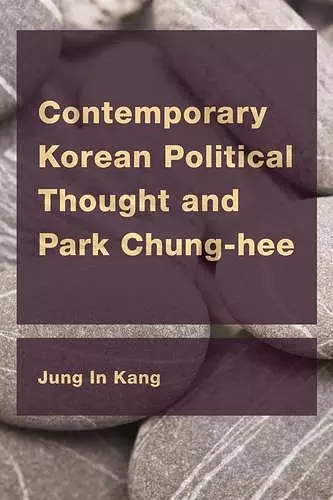Contemporary Korean Political Thought and Park Chung-hee
Format:Hardback
Publisher:Rowman & Littlefield International
Published:12th Jun '17
Currently unavailable, and unfortunately no date known when it will be back
This hardback is available in another edition too:
- Paperback£25.00(9781786602497)

This important new book identifies the distinctive characteristics of the ideological terrain in contemporary (South) Korean politics and reexamines the political thought of Park Chung-hee (1917–1979), the most revered, albeit the most controversial, former president in the history of South Korea, in light of those characteristics. Jung In Kang articulates “simultaneity of the nonsimultaneous” and the “sanctification of nationalism” as the most preeminent characteristics of the Korean ideological topography, which are distinct from those of modern Western Europe, while acknowledging the overwhelming and informing influence of modern Western civilization in shaping contemporary Korean politics and ideologies. He goes on to analyze the political thought of Park Chung-hee, in this way investigating and confirming the academic validity and relevance of those ideological characteristics in more specific terms. The book assesses how nonsimultaneity and sanctification are interwoven with Park’s thought, while reconstructing the political thought of President Park in terms of four modern ideologies: liberalism (liberal democracy), conservatism, nationalism and radicalism. Kang concludes by tracing the changes undergone by simultaneity and sanctification in the three decades since democratization, with some speculation on their future, and by examining the ideological legacy and ramifications of Park Chung-hee’s authoritarian politics in the twenty-first century.
This book is an important contribution to the fortunes of global democratization. Focusing on developments in South Korea during the past seven decades, Kang shows how Korean politics has followed and not followed the dominant Western ideologies of liberalism, conservatism, nationalism, and radicalism.The divergence has to do with the difference between early-comers and late-comers to democracy, that is, with a certain "nonsimultaneity" between Western and non-Western history. Given geopolitical asymmetries, the divergence also puts a certain premium on nationalism and national security, thus showing the crucial embeddedness of democratization in cultural-political contexts. -- Fred Dallmayr, author of Being in the World: Dialogue and Cosmopolis (2013)
A deeply thoughtful, systematic, and timely critical exploration of current South Korean political ideologies, with a particular focus on their relation to the ideas and policies of the former president Park Chung Hee, whose controversial image and legacy continues to define the political fault lines of the country even today. -- Carter Eckert, Professor, Harvard University and author of 'Park Chung Hee and Modern Korea'
"Contemporary Korean Political Thought and Park Chung-hee" by Jung In Kang is an insightful developmental analysis of Korean political thinking in a divided nation in the context of global Cold War (focusing however exclusively on the South, the Republic of Korea). Beginning with Machiavelli's famous diagnosis of bad men trying to achieve noble political ends (and vice versa), Kang shows how Korea (and Park Chung-hee in particular) overcame a "sanctified nationalism" and "simultaneity of nonsimultaneity" to complete "the tasks of modernization and democracy coevally." Yet the modality of its becoming leaves the nation divided. -- Lowell Dittmer, University of California, Berkeley
ISBN: 9781786602480
Dimensions: 239mm x 157mm x 26mm
Weight: 617g
282 pages